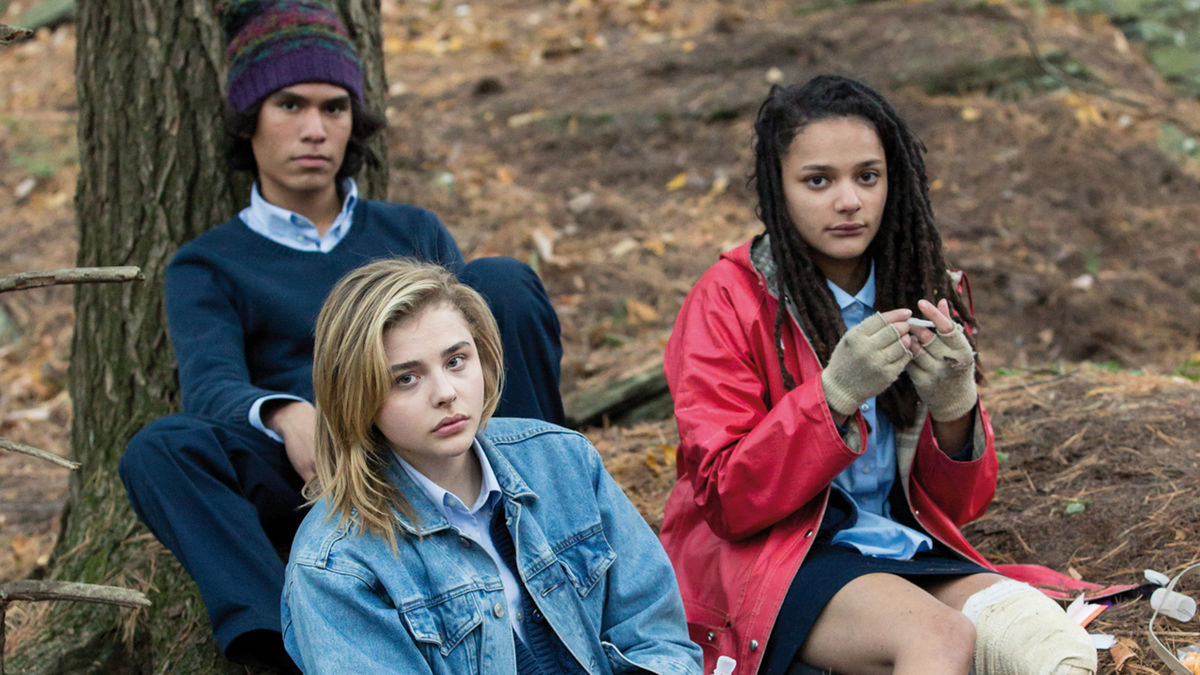There’s a distinct lack of fury at the heart of Desiree Akhavan‘s The Miseducation of Cameron Post. This is worth noting, since the “gay conversion therapy” boarding school on which it focuses offers plenty to be furious about. But in adapting Emily M. Danforth‘s 2012 novel, Akhavan aims for a different tone than righteous indignation. The result is a sad, often funny, ultimately hopeful coming-of-age narrative that takes the alienations and desires of its protagonists seriously, and even extends a measure of empathy to its villains. Whether the latter deserve it may be left up to the viewer.
With cues from But I’m A Cheerleader, One Flew Over The Cuckoo’s Nest, and Short Term 12, The Miseducation of Cameron Post trades the YA novel’s Montana for a generalized Rural Everywhere — it’s shot in a particularly gauzy upstate New York, where it’s always late afternoon — in the early 90s. Chloë Grace Moretz plays the lead of the title, introduced at a Church group where she flirts with Coley (Quinn Shephard) and then rushes home to passionately make out with her. Akhavan doesn’t treat this as a shocking development so much as another lazy Sunday, shot through with desire and an illicit thrill.
Neither of them is out to anyone else. The film staggers their lovemaking with brief snippets of family time and a heteronormative, recognizably dismal prom that turns disastrous when their dates catch them together, half-clothed in the backseat of a car. It’s a passionate montage of desire and despair, and a strikingly frantic opening to a film that will slow down considerably.
The narrative abruptly abandons Coley — an abruptness I admired, from a character psychology standpoint and because that’s also how memory functions sometimes — to follow Cam (as she prefers) to “God’s Promise”. A religious camp for those “suffering from same-sex attraction” (or SSA, in local jargon), God’s Promise is presided over by the benevolent, goofily guitar-strumming “ex-gay” Reverend Rick (John Gallagher Jr.). But the real power lies with its founder, his “Disney villain” sister Dr. Lydia Marsh (Jennifer Ehle). A Nurse Ratched for the teen set, the good doctor coldly presides over group therapy breakdowns and casually refuses to shorten Cam’s name because, as she notes, its abbreviated androgyny only exacerbates our hero’s identity confusion. Charming.
 A quietly rebellious central trio forms as Cam befriends bad girl Jane (American Honey‘s Sasha Lane) and Adam (Forrest Goodluck), a Lakota teen who identifies as two-spirit, bonding over a shared interest in the weed the two therapy vets are growing in the nearby woods. (Unaccompanied hikes are allowed, even if the weed’s not.) There’s a real sweetness and chemistry in the group, especially between Lane and Goodluck, who heartbreakingly convey a mutual affection and instinctive understanding through small gestures and looks. Ashley Connor bathes the forest scenes in a soft light that contrasts with the dark bedrooms and clinical interiors, and Akhavan does an excellent job pacing and framing the interactions. She finds a wellspring of gallow’s humor in the uncomfortable closeness, much as she did in the very different conditions of 2014’s Appropriate Behavior.
A quietly rebellious central trio forms as Cam befriends bad girl Jane (American Honey‘s Sasha Lane) and Adam (Forrest Goodluck), a Lakota teen who identifies as two-spirit, bonding over a shared interest in the weed the two therapy vets are growing in the nearby woods. (Unaccompanied hikes are allowed, even if the weed’s not.) There’s a real sweetness and chemistry in the group, especially between Lane and Goodluck, who heartbreakingly convey a mutual affection and instinctive understanding through small gestures and looks. Ashley Connor bathes the forest scenes in a soft light that contrasts with the dark bedrooms and clinical interiors, and Akhavan does an excellent job pacing and framing the interactions. She finds a wellspring of gallow’s humor in the uncomfortable closeness, much as she did in the very different conditions of 2014’s Appropriate Behavior.
Akhavan suffuses the material with sadness, though. The whip-smart jokes and cringe-comedy — Moretz’s hilarious “… okay” is the only possible response to being told her crush on Coley is akin to a cannibal’s desire to eat an enemy and steal their powers — alternate with a much more melancholy air, emphasized by long takes and unexpected silences. The camp’s denizens are individuals rather than sets of quirks, and Miseducation takes its time introducing them and their routines. When an entirely preventable tragedy on the outskirts of the story occurs, it’s with an air of inevitability. This is a sick hospital filled with healthy patients, tended to by, at best, woefully misguided healers.
The character of Reverend Rick, whose alleged success at praying away the gay was the impetus for the camp’s founding, is the film’s most discordant note, or at least its most surprising. As played here, he is much more tragic and pitiable than malicious. There’s a definite sense that he cares deeply, in fact. Whether or not he believes his sister’s bullshit and has truly made it his own is an open question, but it’s also irrelevant — he’s doing a great deal of harm, no matter how his motivations and psychology are parsed. The Miseducation of Cameron Post is arguably over-kind to him, but give the film points for avoiding the easy out.
If The Miseducation of Cameron Post is sometimes curiously lacking in outrage at outrageous circumstances, its eyes are wide open to this shared sorrow. In the grips of the social and hormonal pressures of adolescence, most teens already feel they’re not quite right, that something inside of them is different, or broken. These teens are told God agrees. The cruelty really doesn’t need to be shouted. It’s everywhere the characters look.
Except, of course, in each other. Without overstatement or false promises, The Miseducation of Cameron Post finds hope in its protagonists’ fugitive moments, along with danger. The world of God’s Promise is a paragon of inauthenticity, and the one outside its gates is fraught and scary, but their solidarity is real.

